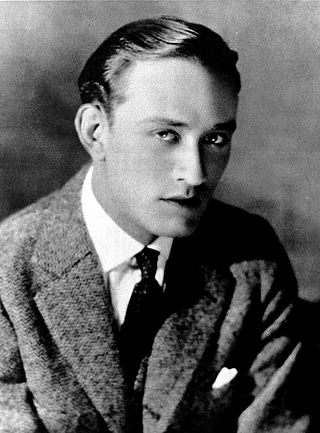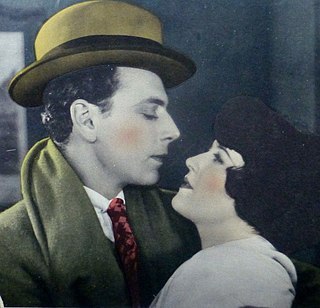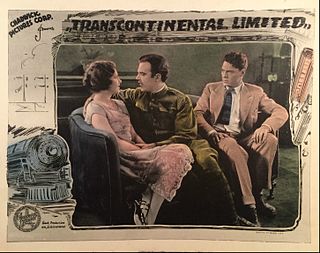
Charles William Haines was an American actor and interior designer.

Thomas J. Moore was an Irish-American actor and director. He appeared in at least 186 motion pictures from 1908 to 1954. Frequently cast as the romantic lead, he starred in silent movies as well as in some of the first talkies.

John Conrad Nagel was an American film, stage, television and radio actor. He was considered a famous matinée idol and leading man of the 1920s and 1930s. He was given an Academy Honorary Award in 1940 and three stars on the Hollywood Walk of Fame in 1960.

Show People is a 1928 American sound comedy film directed by King Vidor. While the film has no audible dialog, it was released with a synchronized musical score with sound effects using both the sound-on-disc and sound-on-film process. The film was a starring vehicle for actress Marion Davies and actor William Haines and included notable cameo appearances by many of the film personalities of the day, including stars Charlie Chaplin, Douglas Fairbanks, William S. Hart and John Gilbert, and writer Elinor Glyn. Vidor also appears in a cameo as himself, as does Davies.

William Collier Jr. was an American stage performer, producer, and a film actor who in the silent and sound eras was cast in no fewer than 89 motion pictures.

Sally, Irene, and Mary is a 1925 American silent comedy drama film starring Constance Bennett, Sally O'Neil, and Joan Crawford. It is based on the 1922 play of the same name by Eddie Dowling and Cyrus Woods and takes a behind-the-scenes look at the romantic lives of three chorus girls and the way their preferences in men affect their lives. The play was adapted again in 1938, again titled Sally, Irene, and Mary and directed by William A. Seiter. That version stars Alice Faye, Joan Davis, and Marjorie Weaver in the title roles, and co-starred Tony Martin, Fred Allen, and Jimmy Durante.

The Only Thing is a 1925 American silent romantic drama film starring Eleanor Boardman. The film's scenario was written by author Elinor Glyn, and was based on a story adapted from Glyn's novel of the same name.
Three Wise Fools is a 1923 American silent drama film directed by King Vidor. A print of the film exists at the Cinematheque Royale de Belgique. It showed in Germany at the Union-Theater Nollendorf, Berlin, on November 10, 1924. The cinema was built in 1913 by Joe Goldsoll, who was president of Goldwyn Pictures from 1922-1924.

Tell It to the Marines is a 1926 American silent romantic drama film directed by George W. Hill and starring Lon Chaney, William Haines, and Eleanor Boardman. The film follows a Marine recruit and the sergeant who trains him. It was the biggest box office success of Chaney's career and the second biggest moneymaker of 1926/1927.

True As Steel is a 1924 American silent drama film directed and written by Rupert Hughes which stars Aileen Pringle and Huntley Gordon. The film is about a married businesswoman who has an affair with a married colleague.

So This Is Marriage is a lost 1924 American silent drama film directed by Hobart Henley. The film was originally released with sequences filmed in the Technicolor 2-color process that depicted the story of David and Bathsheba from the Book of Samuel.

Excuse Me is a 1925 American silent comedy film starring Norma Shearer and Conrad Nagel. It was directed by Alfred J. Goulding, and based on the 1911 play of the same name written by best-selling novelist Rupert Hughes. The comedy concerns naval officer Harry Mallory and his would-be bride Marjorie Newton who spend most of their time running up and down a train looking for a clergyman to marry them.

Sinners in Silk is a 1924 silent romantic drama film directed by Hobart Henley. The film stars Eleanor Boardman, Adolphe Menjou, Hedda Hopper, Conrad Nagel, and Jean Hersholt. It was written by Benjamin Glazer and Carey Wilson.

The Snob is a 1924 American silent drama film directed by Monta Bell. The film starred Norma Shearer and John Gilbert, together with Phyllis Haver, Conrad Nagel, and Hedda Hopper. The film was written by Monta Bell, and was based on the novel The Snob: The Story of a Marriage by Helen Reimensnyder Martin.

The Auction Block is a 1926 American silent comedy film directed by Hobart Henley. The film stars Charles Ray and Eleanor Boardman. It is written by Fanny and Frederic Hatton and is based on the novel of the same name by Rex Beach.

Mike is a 1926 American silent comedy drama film directed by Marshall Neilan. The film is a modest production, featuring Sally O'Neil and William Haines.

Lovey Mary is a 1926 American comedy-drama film directed by King Baggot, with Bessie Love in the title role. It is based on the 1903 novel of the same name by Alice Hegan Rice, a sequel to Rice's Mrs. Wiggs of the Cabbage Patch. It was distributed by Metro-Goldwyn-Mayer.

Let's Get Married is a 1926 American silent comedy film produced by Famous Players–Lasky and distributed by Paramount Pictures. It was directed by Gregory La Cava and stars Richard Dix and Lois Wilson. The film is based on an 1897 play The Man from Mexico by Henry A. Du Souchet performed by William Collier, Sr. This film is a remake of a 1914 film, The Man from Mexico starring John Barrymore which is now considered a lost film.

The Girl from Chicago is a lost 1927 American silent criminal romantic drama film directed by Ray Enright and starring Myrna Loy and Conrad Nagel. It was produced and distributed by the Warner Bros. and is based upon a short story by Arthur Somers Roche that appeared in the June 1923 Redbook. The film later had a Vitaphone soundtrack of sound effects and music added.

Transcontinental Limited is a 1926 American silent drama film directed by Nat Ross and starring Johnnie Walker, Eugenia Gilbert, and Alec B. Francis.



















